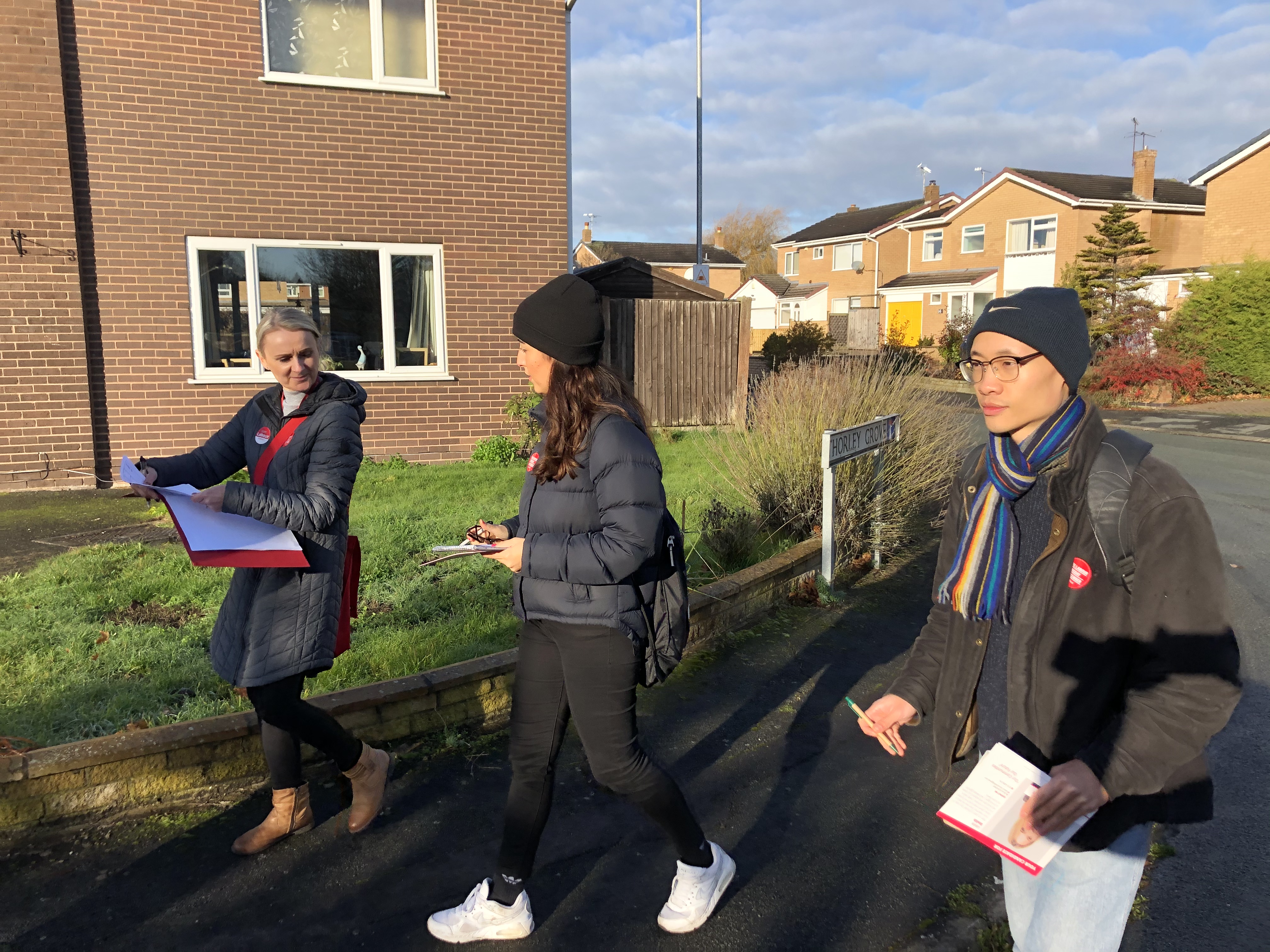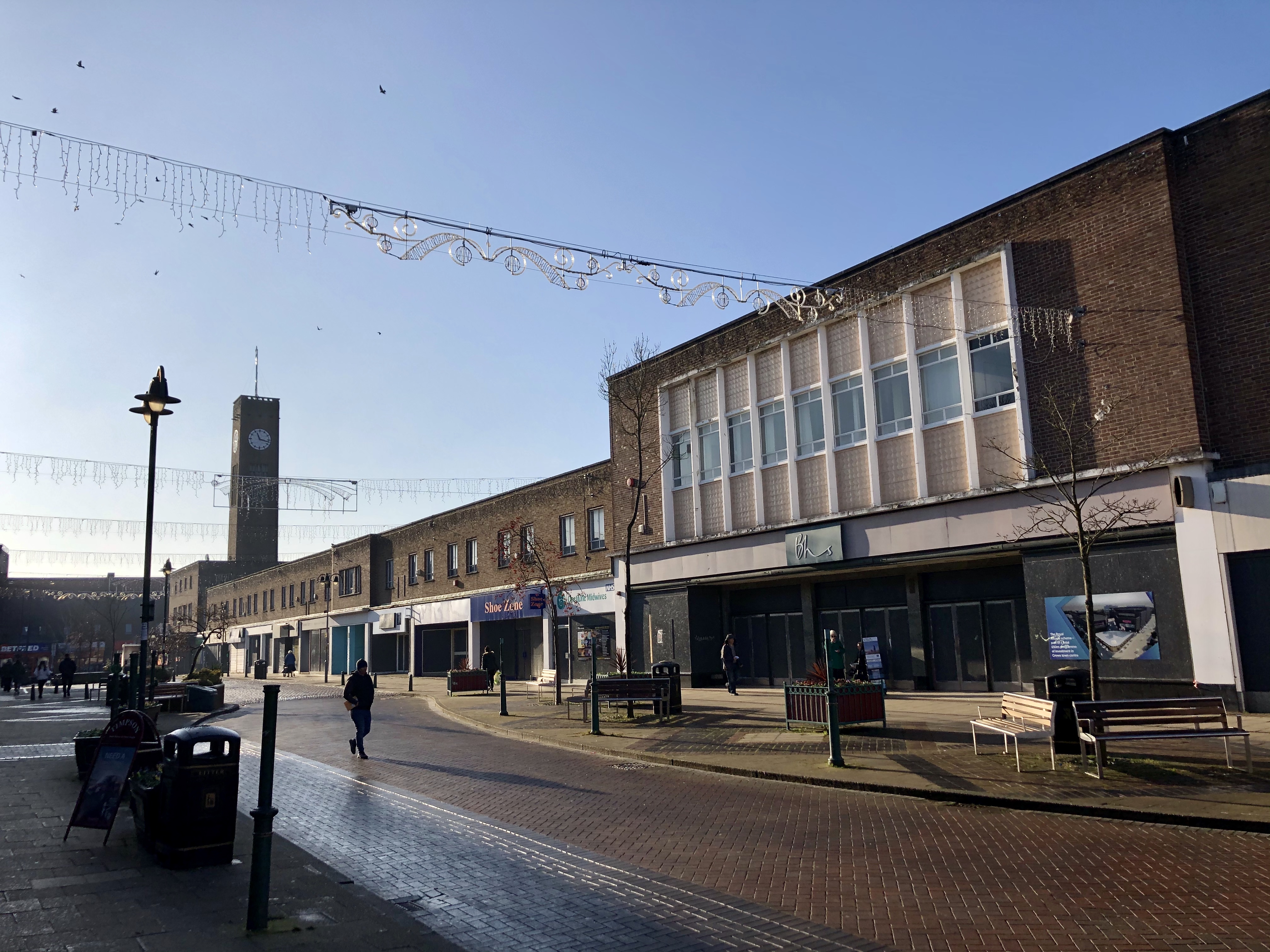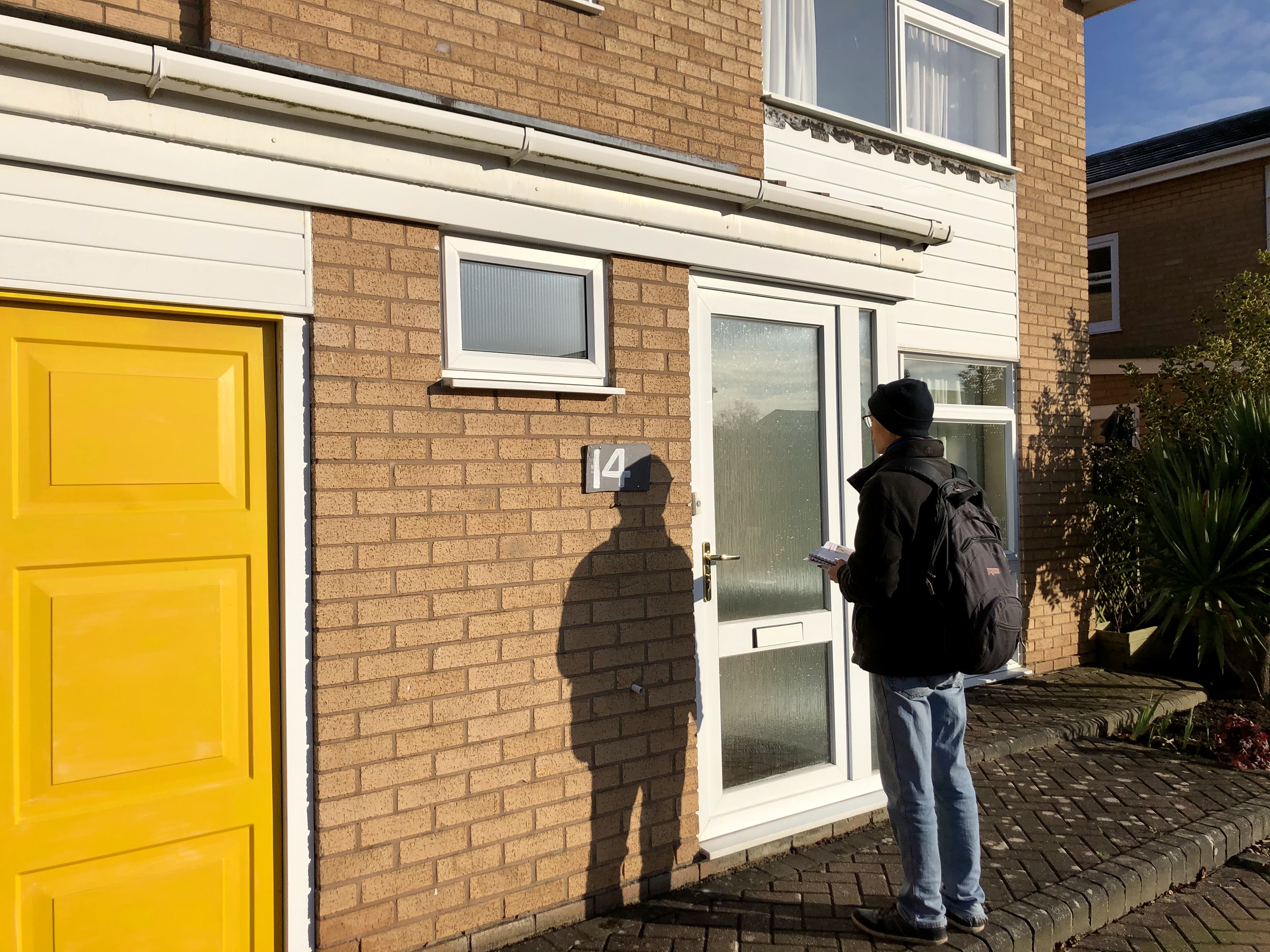At the crossroads where Britain’s future will be decided – just around the back of the Morrisons car park, somewhere between the red brick church and the Chinese chippy – Eda Seyhan is knocking on a door.
“You never know what you’ll find on the other side,” she tells me, as we stomp our feet against the chill. Eda, a 30-year-old campaigning lawyer from Hackney who is currently 150 miles north-west of her comfort zone, has seen it all here: angry Brexiteer men, well-heeled liberal women, a rich tapestry of other UK political clichés and everything in-between.
Videos by VICE
“Whoever it is, once they open up you’ve got maybe two minutes maximum to counter narratives that have been pushed by a hostile media for years and years,” she explains. We glance through the front window, making a thousand subconscious calculations about the potential occupant – age, class, family, interests, views – while preparing to calibrate our pitch accordingly.
Nobody answers. Eda sighs, pushes a leaflet through the letterbox, and moves on to the next house. “Well, it’s better than just sitting at home, scrolling through Twitter and getting angry,” she assures me.
Welcome to the frontline of this year’s general election, and the world of its most fiercely committed foot-soldiers. Crewe and Nantwich is the eighth most marginal constituency in the country, one of the few places in which a relatively small number of residents have a hugely outsized influence over who will be the next prime minister. Labour, which currently holds the seat by 48 votes out of an electorate comprising nearly 80,000 people, has never formed a government without winning here first; for the Conservatives, there is no route to national victory that doesn’t involve gaining it back.

These are the stakes that drew Eda and her friend James Wan – editor of an online magazine covering African current affairs – on a long journey out of east London, to spend a full week door-knocking for Labour at the gateway to the north. Neither had ever been to Crewe before, but after joining overcrowded canvassing sessions in the capital – home to a huge concentration of Labour supporters – they began looking around to see how else they could make an impact. That’s where “Labour Legends”, an ambitious new scheme run by Momentum that asks people to promise at least seven days of full-time, uninterrupted campaigning, came in to play. “It’s either socialism with Jeremy Corbyn or disaster capitalism with Boris Johnson,” claims the group in its online appeal for recruits. “And it’s all down to us.”
Those words seemingly struck a chord. Within a week of Labour Legends going live in early November, more than a thousand people signed up and pledged over two and a half thousand cumulative weeks; stretched back-to-back, that amounts to half a century of non-stop electioneering on the ground. Many are students or freelancers, but the volunteer ranks also include those with disabilities or care duties which might render conventional canvassing difficult; the Labour Legends programme enables them to participate in the campaign in other ways, such as running a phone bank operation from home.
The whole thing is built on a “distributed organising” model inspired by the Bernie Sanders presidential bid in the United States, which decentralises decision-making and grants vast autonomy to local supporters. Between putting their names forward and pulling into Crewe train station on a dark, wet winter’s evening, Eda and James spoke only to fellow volunteers and never held a single conversation with a paid member of Momentum staff. Outgunned financially by wealthy Tory donors, it’s this sort of self-replicating grassroots movement – often flying under the media radar – that Labour is depending on to defy the polling predictions next week and win.

Crewe, once the powerhouse of the UK’s railway industry, is a key brick in the so-called “red wall” of typically post-industrial, working-class and Labour-held seats that stretch from Wrexham in the west to Grimsby in the east, and which the Conservative party believe are vulnerable to their “Get Brexit Done” message (the constituency voted by 60 percent to “Leave” in the EU referendum). Since 2016, no demographic has been more problematically mythologised by a largely London-based political and media establishment than this one. The people of Crewe and other similar communities have been repeatedly wheeled out as a stage prop to represent reductive notions of what “authentic” Britain looks like, and Eda and James – both young, urban, left-wing and minority ethnic – arrived feeling conscious of the fact that they didn’t conform to that stereotype.
“Wherever we ended up, we wanted to be able to have persuasive and useful conversations,” James told me.
“One of the reasons I did this is because I wanted to get a feel for places that are constantly referenced by the Guardian and the BBC and so on as being important to understanding contemporary politics, but are never really analysed in-depth,” added Eda. “The question was, who is going to be convinced by us?”

Plenty, it turns out.
For one thing, the damage wreaked by Britain’s post-2008 economy has plunged middle-class graduates into insecurity as much as it has former factory-hands. Anger at austerity, soaring child poverty and the concentration of wealth and power in the hands of elites is as widespread in Wistaston, the Crewe neighbourhood that lies south of the railway tracks, as it is in Walthamstow.
For another, Crewe’s population is far more diverse than outsiders might assume, something that became apparent from the moment Eda and James encountered their local host: Mary Shepperson, a 38-year-old archaeologist who was recently airlifted out of a dig in Iraq and chose to offer up her spare room to the Labour cause.
“I had no idea what to expect,” she admitted. “For all I knew, it could have been two grungy anarchists heading my way, or a pair of ageing hippies.” It was Mary who became their tour guide to the local political landscape, filling them in on Crewe’s history, social profile and struggles today, and who first directed them towards the town’s Labour party election headquarters – where they were greeted by the candidate herself, Laura Smith, wielding a cup of tea.
“People were a bit bemused at us,” remembers Eda. “One local councillor said, ‘You’ve come from London to Crewe? Really? You know when most people want a trip, they go to Spain…’ But it felt from the start like a really friendly, bottom-up campaign, where the member of parliament is happy to put the kettle on for you and everyone gets stuck in.”
She and James were given a cursory briefing (“LAURA = CHANGE / TORY = MORE OF THE SAME” reads A4 printouts pinned up around the office, which is a neat summary of the message activists are encouraged to push on the doorstep), and then ushered towards a car for their first canvassing session. “We were thrown in at the deep end,” said James.
Over the next few days, Eda and James come to know many of the characters who make up Labour’s local support base – from Nan, a former British Rail employee and anti-fascist activist who celebrated her 75th birthday by getting a “PEACE” tattoo on her wrist, to Marilyn, a roller derby enthusiast who skates for the all-female “Railtown Loco Rollers” – as well as the wide variety of people for whom Crewe is home.
“We’ve gone into leafy suburbs and run-down council estates; it’s white and it’s non-white, it’s rich and it’s poor,” observed Eda.
“In London, it’s easy to feel like you’re in an echo chamber,” said James. “But then you travel a couple of hours expecting to be in completely unfamiliar territory, and you end up talking to people who come from a completely different background than you, but who share more of your political views than some of your friends back home. It makes you realise you really are part of a movement that crosses the whole country, and that’s a great feeling.”

Not that there is always such a positive sentiment on the doorstep. I follow Eda and James as they traipse around tightly-wound terraces and far-flung suburban driveways, not only in Crewe but also the relatively prosperous nearby market town of Nantwich – where houses range from faux Tudor new-builds to genuine Tudor cottages, and are among the most desirable in Cheshire. They meet diehard supporters – families, as Eda puts it, who tend to be more “Labour for life” than their equivalents in London – but also many traditional Labour voters who feel betrayed and disillusioned: by the party, or by formal politics in general, or both.
“I’m done with you lot,” says one Brexit supporter who is frustrated at Labour’s plans for a second EU referendum. “Not while that man is in charge,” insists an older woman, referring to Corbyn. “I’m sorry, but you’ve lost your way.”
Time and again, people praise Smith – a Crewe-born former teacher who is on the left of the party and led a local campaign against school cuts – but express scepticism about the national leadership. No matter the criticism, Eda and James remain patient, understanding and inquisitive. “I appreciate your concerns,” Eda tells the woman. “But this is about more than one person in Westminster. We are Labour too.”
As anyone who has done it knows, canvassing on the doorstep is a simultaneously thrilling and dispiriting experience. Walking for hours on end between homes and, more often than not, finding nobody in when you knock is exhausting, as is the relentless improv performance demanded by each encounter.
After a long period of successive governments who have tried to depoliticise politics, insisting that elections involve selecting the best set of managers to administer the status quo, it often feels like we all lack a shared political language through which to discuss grievances and solutions; far more than Brexit, or Corbyn, the stumbling block that Eda and James come up against most often is simply an absence of faith in institutional politics itself as a means of achieving change.
On several occasions I watch voters express opinions that accord closely with Labour’s manifesto: a desire for more investment in public services, an end to the housing crisis, and new industries to replace Crewe Works, the famous railway construction and engineering centre that once spanned most of the town centre and employed 20,000 people. Today, only a few hundred jobs remain and much of the site is rubble, waiting to be turned into retail units or new homes that are widely expected to be unaffordable; Crewe’s high street, meanwhile, is dominated by boarded-up shops, the product of a controversial and much-delayed regeneration scheme.
At this election, the two major parties have very different visions of how to deal with the legacy of de-industrialisation and late capitalism’s intense regional inequalities, and the ideological gulf between them is enormous. Yet many of those same voters dismiss Eda and James with a weary refrain of “they’re all the same” or “I want nothing to do with it”.

“We have an identity here, a proud one, that is bound up with the railway,” Jim Cockburn, a train driver, told me. “But now it’s a ghost identity. Where the works were, there’s a supermarket and flats. It wears people down.”
Kieran Hastings, a 34-year-old employed at Crewe’s Bentley Motors plant, another local landmark, agrees. “People have been burned badly by politicians,” he said, sweeping his arm around us. “They’ve just given up a little bit on the hope that someone, anyone, will come along who can actually change things.”
Labour’s ultimate battle in Crewe is not to convince people that their party is preferable to the current administration. After nine years of Tory rule, popular discontent at the government is palpable in the area – and for every former Labour supporter who now appears to be wavering, Eda and James also come across an embittered Conservative-inclined voter who is struggling to back Boris Johnson and open to alternatives. Instead, it is to persuade people that electoral politics itself has any real meaning, something which the “Labour Legends” idea might just help to address.
Although the pair have made a practical difference to the campaign here, making up the critical numbers needed for several canvassing trips and becoming knowledgeable enough to lead sessions themselves (during Eda and James’ visit, Labour volunteers in Crewe managed to hold 6,000 doorstep conversations in a single week, the most of any constituency in the region), Eda thinks the real value of their experience lies in something more intangible: a sense of politics being something that impacts us all collectively – rather than a game that plays out on green benches in the distance – and something which collectively we can have an impact on ourselves.
“It’s about movement-building,” she concludes. “Door-knocking in London is great but it sometimes feels quite transient; here, we’ve felt part of a real community campaign, a common project that actually cuts across all those fault-lines that we are constantly being told are dividing Britain. It doesn’t matter if we have a Crewe accent or a London accent, it’s a feeling that we are fighting for shared values and beliefs. That’s what politics should be, and that’s what we’ve found here.”
More
From VICE
-

Screenshot: Bethesda Softworks -

Screenshot: Nintendo -

Kypros/Getty Images -

